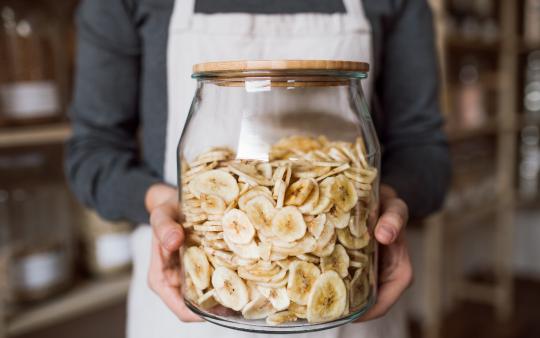Spring is a time of renewal and rebirth. Traditionally it is seen as a time to clean up, reorganize and start fresh. As the regrowth of bulbs and perennial plants begins, so should you. Take this time to clean out your pantry and prepare for the growing season.
Take stock of your pantry
It’s easy to forget what’s in your cupboard, so as you clean it up make sure to take an inventory of your supplies. This will help reduce waste, save you money, and encourage you to use up what you have.
Take a moment and think about what is your pantry. Is it filled with aluminum cans, packaged cereals, chips, crackers, and salad dressings? If so, it might be time to introduce some new, healthier alternatives.
Five favourite pantry essentials
Want to keep convenience, good digestion, and nutrition in mind while staying natural? You can have all of that together right in your cupboard. Here are five must-have items for your pantry this spring.
Apple cider vinegar (with the mother)
White vinegar is a product of the pulp paper industry. While useful as a cleaning agent, it provides no real nutrients to the diet. In cooking, it is an important component that gives a sharp acidity to help flavour soups, stews, and dressings. Try substituting white vinegar with naturally fermented ACV with the mother. This can also help your body produce bile and assist with digestion. Take 1 tbsp of ACV in 1 oz of water before meals. Add a little bit of lemon juice or honey, if you like it more palatable.
Oils
Humans depend on natural, healthy fats. The oils we depend on come from meat, seafood, dairy, nuts, and seeds. Oils are prone to oxidation and have different smoke points. Substitute heavily refined cooking oils (including corn, soy, and canola oil) with these alternatives:
- Choose cold-pressed extra virgin oils: olive, avocado and sunflower. High in monounsaturated fats and an excellent choice for dips and dressings. Avoid heating.
- Hemp and flax oil are polyunsaturated fats and high in omega-3 fatty acids. Ensure these oils are kept refrigerated, packaged in dark-coloured glass, and stored away from heat and direct sunlight.
- Coconut oil and clarified butter are saturated fats and best used for cooking at high temperatures.
Dried pulses
Pulses, including lentils and beans, are high in fibre and protein. Even though canned pulses may be more convenient to buy, be warned that they may contain aluminum, a known heavy metal. Aluminum is associated with early onset dementia and exposure to this material should be minimized. To add insult to injury, aluminum cans are also also lined with BPA, a hormone disrupting chemical. Avoid this by purchasing dried beans and lentils. Store in airtight containers. Follow this guide for pulse soaking and sprouting methods.
Herbs and Spices
Dried herbs and spices are highly concentrated in flavour and can transform the dullest ingredients into a memorable meal. Dried herbs and spices lose flavour over time. Like coffee, these are best freshly ground. A spice grinder or mortar and pestle are a must. Experiment by dry roasting your spices for added flavour.
Herbal tea blends are useful for satiating thirst, supporting health conditions, and even for bathing in! You can infuse herbs with hot water or make sun tea in the summer. The following herbs are easily grown in the northern hemisphere:
- Lemon balm
- Peppermint
- Spearmint
- Calendula
- Lavender
- Bergamot
- Marshmallow root
- Burdock root
- Chicory
Pick, air-dry continuously in a well-circulated area, and store in an airtight container.
Bulk Ingredients
Bulk food stores help you control how much you purchase. Some things to consider stocking up on might include:
- Dried fruit (apricots, prunes, raisins, cranberries, dates — look for them sulphite-free)
- Honey (local, unpasteurized)
- Maple syrup
- Seeds and nuts (sunflower, pumpkin, buckwheat, chia, poppy seed, hemp)
- Grains (organic unbleached all purpose flour, spelt, quinoa, millet, rice, etc.)
- Pulses (beans and lentils)
- Preserves in saltwater brine (capers, olives, pickles, hot peppers)
- Strained tomatoes (in glass)
Bonus: Learn how to make your own preserves and refill your own pantry! Happy stocking!









